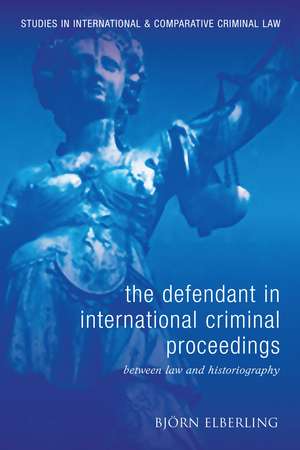The Defendant in International Criminal Proceedings: Between Law and Historiography: Studies in International and Comparative Criminal Law
Autor Björn Elberlingen Limba Engleză Hardback – 30 aug 2012
Din seria Studies in International and Comparative Criminal Law
- 30%
 Preț: 897.55 lei
Preț: 897.55 lei - 21%
 Preț: 275.26 lei
Preț: 275.26 lei - 18%
 Preț: 358.30 lei
Preț: 358.30 lei - 30%
 Preț: 540.65 lei
Preț: 540.65 lei - 27%
 Preț: 345.42 lei
Preț: 345.42 lei - 28%
 Preț: 465.96 lei
Preț: 465.96 lei - 27%
 Preț: 442.83 lei
Preț: 442.83 lei - 27%
 Preț: 501.70 lei
Preț: 501.70 lei - 14%
 Preț: 603.73 lei
Preț: 603.73 lei - 14%
 Preț: 509.52 lei
Preț: 509.52 lei - 24%
 Preț: 374.34 lei
Preț: 374.34 lei - 11%
 Preț: 374.34 lei
Preț: 374.34 lei - 30%
 Preț: 779.33 lei
Preț: 779.33 lei - 30%
 Preț: 893.89 lei
Preț: 893.89 lei - 24%
 Preț: 190.33 lei
Preț: 190.33 lei - 30%
 Preț: 570.02 lei
Preț: 570.02 lei - 18%
 Preț: 302.99 lei
Preț: 302.99 lei - 18%
 Preț: 297.86 lei
Preț: 297.86 lei - 18%
 Preț: 319.86 lei
Preț: 319.86 lei - 30%
 Preț: 603.81 lei
Preț: 603.81 lei - 30%
 Preț: 718.27 lei
Preț: 718.27 lei
Preț: 774.62 lei
Preț vechi: 1113.41 lei
-30% Nou
Puncte Express: 1162
Preț estimativ în valută:
148.24€ • 154.20$ • 122.38£
148.24€ • 154.20$ • 122.38£
Carte tipărită la comandă
Livrare economică 15-29 aprilie
Preluare comenzi: 021 569.72.76
Specificații
ISBN-13: 9781849462662
ISBN-10: 1849462666
Pagini: 270
Dimensiuni: 156 x 234 x 22 mm
Greutate: 0.57 kg
Ediția:New.
Editura: Bloomsbury Publishing
Colecția Hart Publishing
Seria Studies in International and Comparative Criminal Law
Locul publicării:London, United Kingdom
ISBN-10: 1849462666
Pagini: 270
Dimensiuni: 156 x 234 x 22 mm
Greutate: 0.57 kg
Ediția:New.
Editura: Bloomsbury Publishing
Colecția Hart Publishing
Seria Studies in International and Comparative Criminal Law
Locul publicării:London, United Kingdom
Caracteristici
This book analyses the position of the defendant in International Criminal Proceedings and more specifically whether defendants are viewed as subjects or objects of proceedings.The first part of the book considers to what extent defendants are able to take an active part in international criminal trials by taking an in-depth look at the procedural regimes of international courts.The book then uses the results of this comparative study to shed light on the oft-debated question whether (international) criminal trials should be used as a tool for writing history or whether pursuing this goal leads to a danger of "show trials".Will be of interest to those working in the field of international criminal law.
Notă biografică
Björn Elberling is an attorney in private practice in Kiel, specialising in criminal defence, media law and migration law. He is a former Research Fellow at the Walther Schücking Institute of International Law, University of Kiel.
Cuprins
Introduction Part I - The Defendant in International Criminal Proceedings1. Can There Be Proceedings (in the Defendant's Presence) at All? A The Absolute Ban on Proceedings Against Deceased Defendants B Fitness of the Defendant to Stand Trial C Proceedings in the Absence of the Defendant 2. The Position of the Defendant in the Trial A Position vis-à-vis Counsel B Position vis-à-vis the Court C Ability to Make Statements 3. The Position of the Defendant in Developments Alongside the Trial 4. Summary Part II: Between Impunity and Show Trials? - Between Law and Historiography5. The Relationship between Criminal Trials and Historiography 6. Tracing the Influence of Historiography on the Law Conclusion Bibliography
Descriere
It is often said that criminal procedure should ensure that the defendant is a subject, not just an object, of proceedings. This book asks to what extent this can be said to be true of international criminal trials.
